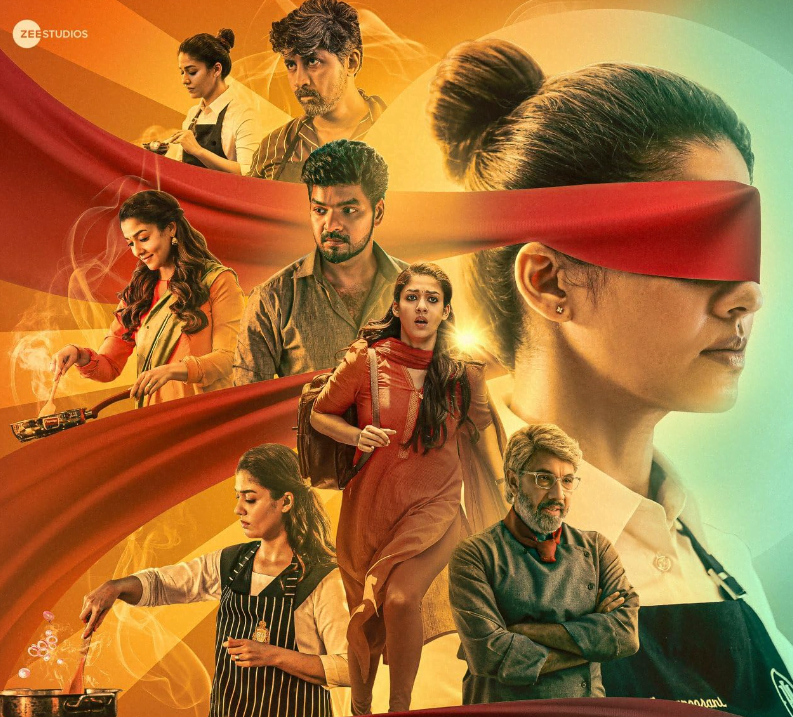The Lady Superstar Nayanthara, Jai, and Sathyaraj starrer and debutant Nilesh Krishnaa’s directorial ‘Annapoorani: The Goddess of Food,’ co-produced by Zee Studios was taken off from Netflix following a formal apology issued by Zee Entertainment on January 10 after facing widespread outrage from hardline right-wing Hindutva organisations, Vishva Hindu Parishad(VHP), the familial organisation to the fascist Rashtriya Swayamsevak Sangh(RSS).
They claim that the film has hurt the religious sentiments of the Hindu fraternity precisely the Brahmins and allegedly promoting love jihad. Annapoorani premiered on the OTT platform on December 29, followed by its theatrical failure, released on December 1.
Tracing the rightwing accusations
Following its box-office failure, Annapoorani premiered on Netflix after receiving approval from the Central Board of Film Certification(CBFC)’s Chennai regional office. The film provoked hardline right-wing groups and received criticism and backlash from several viewers on social media and members of Vishva Hindu Parishad(VHP) labelling the film anti-Hindu and anti-Ramayana.
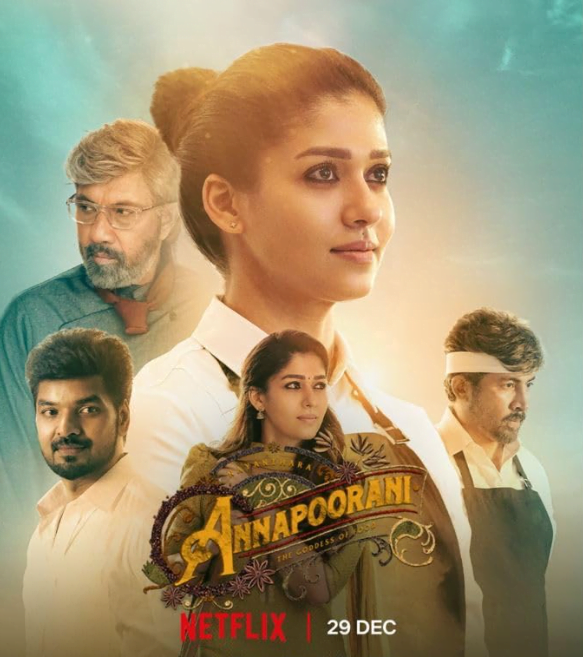
The Hindu IT Cell founder and former Shiv Sena leader Ramesh Solanki lodged an FIR against the creators of the film on January 6. The complaint was filed against eight people including Director Nilesh Krishnaa, Nayanthara, Jai, the producers R Ravindran and Jatin Sethi, Netflix India CEO Monika Shergill, CEO of ZEE Studios Shariq Patel and Punit Goenka.
In the FIR statement, shared on X, he claims that Annapoorani demeans lord Ram and was intentionally released to hurt Hindu sentiments ahead of the Shri Ram Mandir Pran Prathishta(Consecration) on January 22 of this year. He has vehemently raised his objection to certain scenes and the controversial dialogue in which Annapoorani(Nayanthara), the protagonist’s Muslim friend Farhaan (Jai) recites a Sanskrit Shlok which translates and interprets the Hindu deity lord Ram as a meat-eater.
VHP Mumbai and National spokespersons, Shriraj Nair and Vinod Bansal respectively shared a clip from the film on X, expressing their disapproval and rage, against it and demanding strict action and a warning for the removal of the same from Netflix. Shriraj also shared a video in which the karyakartas are shown protesting against Netflix with the chants of Jai Shri Ram.
Decoding the alleged controversial scenes in Annapoorani
Quoting Lord Ram as a meat-eater: In allegedly the most controversial scene, Farhaan in an attempt to convince Annapoorani that eating meat would not make her a sinner, recites a Sanskrit shloka(verse) from the Valmiki Ramayana, describing an instance where the famished lord Ram and Lakshman along with Sita hunted and consumed meat when in exile.
He does that as she was required to learn to cook meat in her Hotel Management Institute where she enrolled without her conservative family’s knowledge. The protagonist is born into the seventh generation Brahmin family who prepare food offered to the deity and the devotees who consume only vegetarian food and consider being in a place where meat is prepared to be a sin, let alone its consumption.
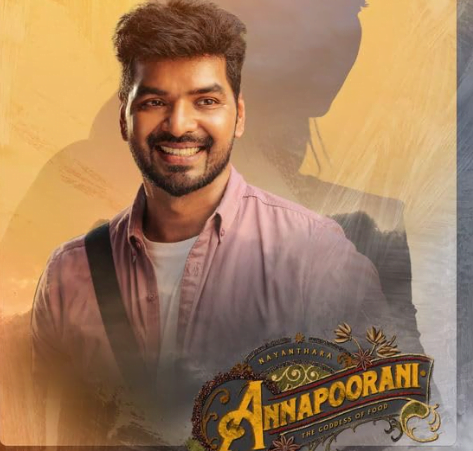
Farhan says no God has denied the consumption of meat, to which she asks if it was right for her to consume meat. He replies, “It is your choice. No one has the right to tell you what you should eat or not eat.” He also mentions that even though his mother has chosen to be a vegetarian still cooks one of the best biryanis.
Farhan cannot be seen persuading or ‘brainwashing,’ Annapoorani as alleged by Solanki. But can be perceived as a well-wisher, supporting and encouraging a friend’s dream of becoming a top chef.
The love-jihad angle: There has not been an evident romantic relationship between the characters. Although Farhan develops feelings, Annapoorani never explicitly expresses what she feels for him or an instance where he attempts her conversion to Islam. The Hindutva group’s claims of the presence and promotion of Love Jihad in the film fail with a lack of precise evidence.
Nonetheless, there has not been a ‘falling in love with a Muslim,’ scene in which forced conversion is promoted. Hence, any romantic angle cannot be taken as the promotion of the conspiracy theory of Love Jihad.
Brahmin Annapoorani offering Namaz before cooking Biryani: In the climactic scene as a part of a competition to become India’s best chef, Annapoorani is faced with the challenge of preparing biryani. She is reminded of Farhaan’s mother’s secret ingredient, offering Namaz and doing what you know best, leaving the rest to God. She is seen following the person from whom she learned to cook biryani wearing a hijab, which apparently hurts the Hindu sentiment. This scene though seems exaggerated or excessively dramatic and unnecessary, cannot be considered immoral or promoting love jihad and was not under coercion.
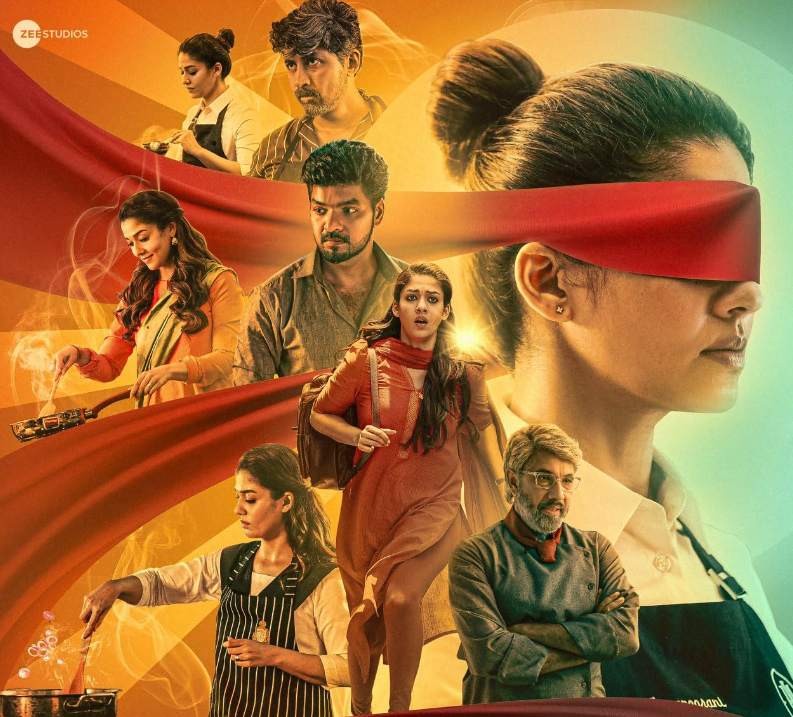
According to Chapter: IV The Freedom of Religion under the Indian Constitution, one has the right to follow the religion of their choice and nothing immoral or forced has taken place. This scene can merely be treated as an artistic expression of the creators and not as propaganda against the Hindu community as Farhan’s mother never persuades her to offer Namaz before preparing biryani.
Zee Studio’s apology
Zee Entertainment Enterprises Ltd sent a formal apology letter to VHP stating, “We have no intentions as co-producers of the film to hurt the religious sentiments of the Hindu and Brahmin communities and would like to hereby apologise for the inconvenience caused and hurt caused to the sentiments of the respective communities.” It said that Annapoorani would only be relaunched to Netflix once the objectionable scenes were edited or deleted.
Actor Parvathi Thiruvothu in her Instagram story wrote, “A dangerous precedent being set. Censoring left right and ‘centre,’ until we won’t be allowed to breathe.”
“Fanaticism won, creativity lost. Shame on @NetflixIndia for giving in to majoritarian bullying” tweeted Siddharth condemning Netflix India’s decision to take down the film from the OTT platform.
Actor Nayanthara has not commented yet on the incident. She and the rest seven have been booked under sections 153-A (promoting enmity between different groups), 295-A (deliberate and malicious acts intended to outrage religious feelings), and 505 (statements conducting public mischief) read with 34 (common intention) of the Indian Penal Code.
Rise of rightwing censorships
This is not the first time that religious groups have raised or made an outrageous attempt to ban a film stating that their religious sentiments are hurt. In 2013 Kamal Haasan’s blockbuster film Vishwaroopam faced backlash and was taken down from theatres in the second week itself.
Deepika’s song Besharam Rang from the Pathan film received a demand to ban the song as it hurts Hindu sentiments as she is seen wearing a saffron-coloured bikini.
Shiv Sena vandalised theatres when Shabana Azmi-Nandita Das’s starrer film Fire was released in the 90s. The reason for this was the romantic relationship between Azmi’s and Das’s characters Radha and Sita respectively which are also the Hindu Goddess’s name.
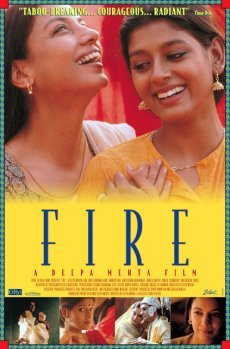
“Nobody should be targetted… if you want to target Hindus, target everybody,” says Ramesh Solanki in his interview with Times Now mentioning Annapoorani to be a propaganda film.
Even if as claimed, the film hurts the religious sentiments or targets and makes the Hindu community the ‘scapegoat,’ it would not make sense if the repercussions would be to hurt other religious groups as said by Solanki.
The film does not contain the components of a “love Jihad” or “anti-Hindu” aspect as claimed by right-wing Hindu organisations. Nevertheless, it may be interpreted as an effort to promote religious unity or merely as a friend supporting another friend’s ambitions who happened to belong to a different religious and caste background. Due to such religious extremists, it is the creativity and the freedom of speech of creators that are getting lost.
About the author(s)
Hrithika Haridas (she/her) is a final year MA Communication (Media Practice) student at the University of Hyderabad. She tries to look at things through the political, gender, class, and caste lens unlearning and relearning conventional normatives pushed on to us. She wants to be an inclusive content creator, inclusive of caste, class and gender minorities.
